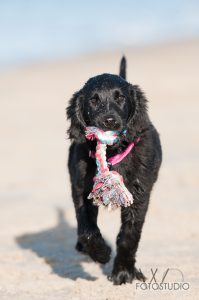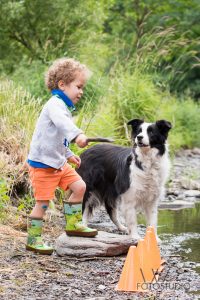
It’s not always easy to know whether a pup has been/is good socialized. Despite the fact there are no guarantees, you can follow the guidelines below while purchasing a pup or dog.
We will highlight some points of attention to see if your pup is/has been well socialized. This will enhance the chance in booking success in raising a pup and reduce the risks on behaviour problems later in life.
Of course, each pup and each situation is different. So, these guidelines are general directives which can differ in individual cases. Be aware that the age of your pup while purchasing will influence some factors.
SOCIALISATION IS LEARNING HOW TO DEAL WITH STIMULI
Socialization starts at the age on which all senses of a pup start to work. This is about 3 weeks of age. So, the process of socialization already starts at the breeders.
Socialization of a pup goes on after being purchased by a new owner and in fact goes on during the whole life of a dog. It’s all about learning dog language, human language and bounders of what is allowed and not allowed.
When a puppy lives together with other dogs (mother, litter mates and/or other dogs) it learns normal dog language. It’s necessary for a pup to learn this in an adequate way (so not being taken away from the mother and litter too early) so in later life he can communicate and behave well with other dogs.
The number of stimuli is important. An absolute lack of stimuli (e.g. being in a dark barn or kennel) can lead to an impossibility to learn social behaviour, which in turn can lead to behavioural problems. On the other hand, a too big amount or too severe stimuli can also cause problems because the pup may not be able to cope and get hypersensitive. Hypo stimulation as well as hyperstimulation can both lead to a bad socialization, leading to insurmountable behavioural problems.
WHAT ARE STIMULI?
Stimuli are all things to encounter in the environment of a dog. It’s about living, as well as non-living stimuli.
Living stimuli:
- Divers types of people: male, female, baby, toddler, teenager, adult, aged, diverse types of clothing, wheelchair, …
- Other animals: other dogs, cat, horse, sheep, chicken, rabbit, …
Non-living stimuli:
-
activities from the household: vacuum cleaner, dishwasher, lawn mower, tv, computer, dishes, keys, steps at the door, …
-
means of transportation and moving things: car, bike, train, children’s car, garbage can, truck, tractor, transport kennel, …
-
marketplace, terrace, fair, … (take care of hyperstimulation!)
The most important is that a pup must learn to know the things of importance in your life!
WHAT IS OR CAN POINT TO GOOD SOCIALIZATION
-
Environment at breeder’s place

- Mother and/or one or more adult dogs are present. You can meet those dogs.
- The pup is raised in a domestic environment and has contact with domestic sounds and activities (for instance lawn mower, washing machine, tv, …)
- The pup and the bitch have access to outdoors and/or are let out on a regular base. (dependant on the age of the pup).
- The pup feels safe and can be at ease in the litter environment.
- It would be ideal if the pup (at least sometimes) has contact with children and cats (for sure if you have cats yourself).
-
Behaviour of the pup
- The pup makes easy contact with you and your children and can bare being touched by you and your children.
- The pup explores the environment when being out of the litter.
- The pup shows not one single sign of aggression to you or your kids (showing teeth, growl, bite apart from game).
-
Behaviour of the mother
- Maternal aggression (aggression near the pups) can occur and is not abnormal, but the bitch must be able relax in proximity of the owner. She feels safe and supported by the owner, so the maternal aggression disappears after a short while.
- Any other sign of aggression is not acceptable.
- The bitch is friendly towards you and your children.
- The bitch shouldn’t be anxious.
-
The breeder
- The pups and the bitch trust in the breeder and feel safe in his proximity. Both mother and puppies follow the breeder in an enthusiastic way.
- The breeder handles the pups and other dogs in a gentle way.
- Always ask if behavioural problems in parents and ancestors have occurred;
